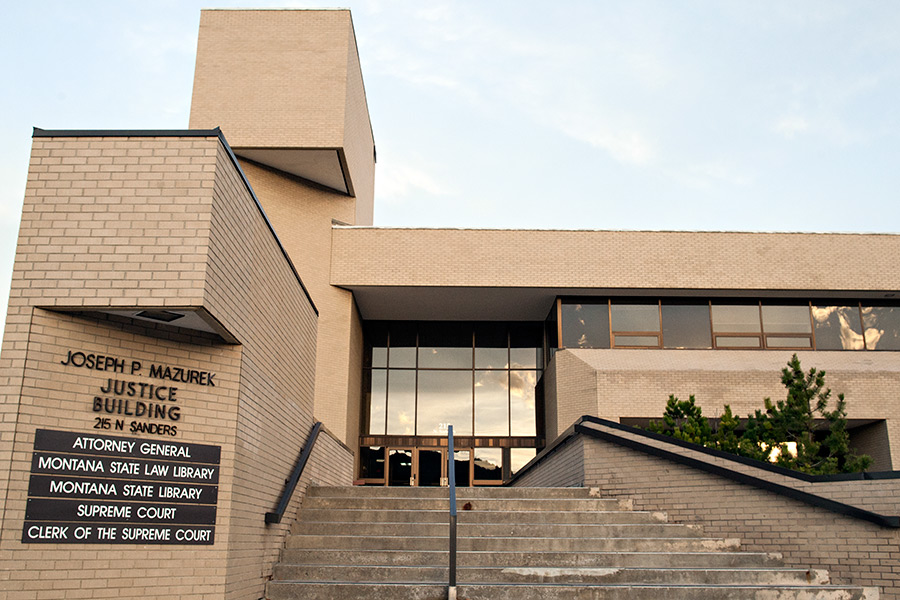Candidates in the nonpartisan race for two seats on the Montana Supreme Court are caught on either side of a sharp partisan divide as one candidate’s Republican supporters fund an ad campaign attacking the other as a liberal activist judge.
And, with less than a week before the November election, an investigation is underway into a recent election mailer that was sent to 100,000 Montana voters, ranking the race’s four judicial candidates on various sides of a partisan spectrum.
In the race, candidate W. David Herbert is taking on sitting Supreme Court Justice Jim Rice, and candidate Lawrence VanDyke is trying to unseat incumbent Justice Mike Wheat.
While Montana judicial elections are nonpartisan, meaning that candidates cannot identify with a political party – rules meant to ensure an independent judiciary – supporters of VanDyke have made a concerted effort to cast Wheat as a liberal activist judge. VanDyke’s Republican backers have spent tens of thousands of dollars on ads to support that message, while Wheat and his supporters launched their own ad campaign in a race that usually maintains a low profile on the ballot.
Wheat says the money battle is disturbing evidence that the U.S. Supreme Court’s 2010 Citizens United decision allowing increased corporate spending in federal elections has started influencing even the state’s bottom-of-the-ticket races, like the judiciary, which is supposed to be uninfluenced by politics.
Wheat is campaigning to keep the seat he was appointed to in 2010 by then-Gov. Brian Schweitzer, while VanDyke, an attorney and the former state solicitor general, has never run for elected office. His website banner reads “following the law, not the politics,” and he insists he has no agenda in running for the high court other than to uphold the law.
The race had already adopted a politically charged profile and generated headlines when the erroneous mailers began arriving in voters’ mailboxes.
In addition to rating how liberal or conservative the four nonpartisan candidates for Supreme Court are, the mailer – sent by researchers at Stanford University and Dartmouth College – also included the Seal of the State of Montana, suggesting that the mailer was an official voter guide sanctioned by the state.
The fliers place the candidates on a scale that ranges from “More Liberal” to “More Conservative,” represented by images of President Barack Obama and former Republican Massachusetts Gov. Mitt Romney, respectively, at either end of the scale.
According to Stanford’s website, the mailers were sent as part of a research project.
Montana officials, along with administrators from Stanford University, launched separate investigations last week.
The mailers also prompted U.S. Sen. Jon Tester, D-Mont., to send a letter to the presidents at both academic institutions expressing his outrage.
“It is absolutely unacceptable that these institutions are using Montana elections as a political laboratory experiment, at the expense of free and fair judicial elections in our state,” Tester wrote. “Your institutions may have now influenced these decisions by meddling in our elections. Perhaps that was not the intent, but nevertheless, it may well be the outcome of this endeavor. In doing so, it is also possible that your institutions have violated state and federal law, and I will ask appropriate authorities to fully investigate this possibility.”
Montana Secretary of State Linda McCulloch has filed a complaint with the Commissioner of Political Practices asking the office to investigate any potential wrongdoing.
A member of the Senate committee with jurisdiction over the U.S. Postal Service, Tester called for the chief postal inspector to investigate whether the two schools may have violated the Deceptive Mailings Prevention Act.
“The integrity of our elections is what preserves our democracy. Efforts to undermine elections in Montana – whether by fraud or merely by poorly-designed experiments – must not be tolerated,” Tester wrote. “I will do all I can to ensure that Montana voters and their beliefs decide our elections, not outside influences.”
Justices Wheat and Rice have both been critical of the U.S. Supreme Court’s 2012 ruling in a Montana case that upheld the Citizens United decision, which, by endowing personhood to corporations, allowed them to spend unlimited money on elections.
In reaffirming its 2010 decision, the U.S. Supreme Court said that a state court was wrong to uphold Montana’s century-old ban on political spending by businesses. The ruling came as a disappointment to Rice and Wheat, who both wrote a brief in support of the ban.
